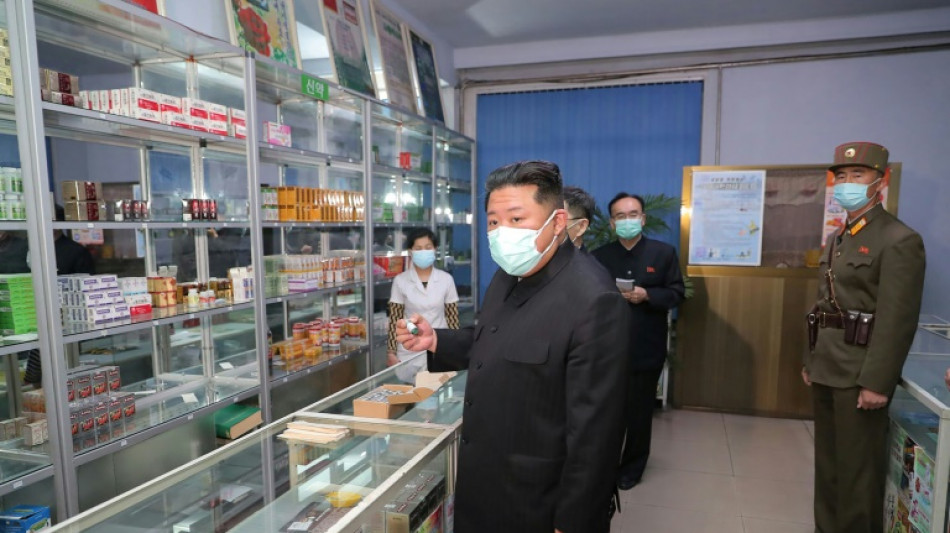Kim Jong Un slammed North Korea's pandemic response and ordered the army to help distribute medicine, state media said Monday, as the country said 50 people had died since first reporting an outbreak of Covid-19.
More than a million people have been sickened by what Pyongyang is referring to as "fever", state media said, despite leader Kim ordering nationwide lockdowns in a bid to slow the spread of disease through the unvaccinated population.
In a sign of how serious the situation may be, Kim "strongly criticised" healthcare officials for what he called a botched response to epidemic prevention -- specifically a failure to keep pharmacies open 24/7 to distribute medicine.
He ordered the army to get to work "on immediately stabilising the supply of medicines in Pyongyang", the capital, where Omicron was detected last week in North Korea's first reported cases of Covid-19.
Kim has put himself front and center of North Korea's disease response, overseeing near-daily emergency Politburo meetings on the outbreak, which he has said is causing "great upheaval" in the country.
The failure to distribute medicine properly was "because officials of the Cabinet and public health sector in charge of the supply have not rolled up their sleeves, not properly recognizing the present crisis," state media KCNA reported Kim said.
Kim, who visited pharmacies to inspect first hand, "strongly criticised the Cabinet and public health sector for their irresponsible work attitude," KCNA said.
He also criticised lapses in official legal oversight, flagging "several negative phenomena in the nationwide handling and sale of medicines."
North Korea has one of the world's worst healthcare systems, with poorly-equipped hospitals, few intensive care units, and no Covid treatment drugs or mass testing ability, experts say.
"While visiting a pharmacy, Kim Jong Un saw with his eyes the shortage of medicines in North Korea," Cheong Seong-jang, researcher at the Sejong Institute told AFP.
"He may have guessed but the situation may have been more serious than he had expected."
KCNA said that as of May 15, a total of 50 people had died, with 1,213,550 cases of "fever" and over half a million currently receiving medical treatment.
North Korea had maintained a rigid coronavirus blockade since the pandemic began, but with massive Omicron outbreaks in neighbouring countries, experts said it was inevitable Covid would sneak in.
- Crisis mode -
Kim's public criticism is a sign that the situation on the ground is grim, said Yang Moo-jin, professor at the University of North Korean Studies in Seoul.
"He is pointing out the overall inadequacy of the quarantine system," he said.
Kim has previously said the country will "actively learn" from China's pandemic management strategy, according to KCNA.
China -- the world's only major economy still maintaining a zero-Covid policy -- is battling multiple Omicron outbreaks with lockdowns in some major cities, including financial hub Shanghai, sparking increasing public frustration.
North Korea has previously turned down offers of Covid vaccines from China and the World Health Organization's Covax scheme, but both Beijing and Seoul have issued fresh offers of aid since the outbreak was announced.
North Korea is likely to need international assistance to get through the massive Omicron surge, Yang said.
"If China's assistance is not enough to overcome the outbreak, North Korea will ask the South, the United States or international organisations in the end," he said.
US President Joe Biden is set to visit Seoul later this week, with discussions of Pyongyang's weapons programs and Covid-19 outbreak likely to top the agenda.
Despite the public health crisis, new satellite imagery indicates North Korea has resumed construction at a long-dormant nuclear reactor.
The United States and South Korea have warned that Kim is preparing to conduct another nuclear test -- the regime's seventh.
Analysts have warned Kim could speed up testing plans to distract the population from the disastrous coronavirus outbreak.
Taking pandemic help from South Korea would both hurt North Korea's "ego" and force it to hold off on its nuclear testing plans, said researcher Cheong.
"If Kim Jong Un is determined to conduct a test, he will not accept South Korea's help," he said.
O.Mallick--BD
